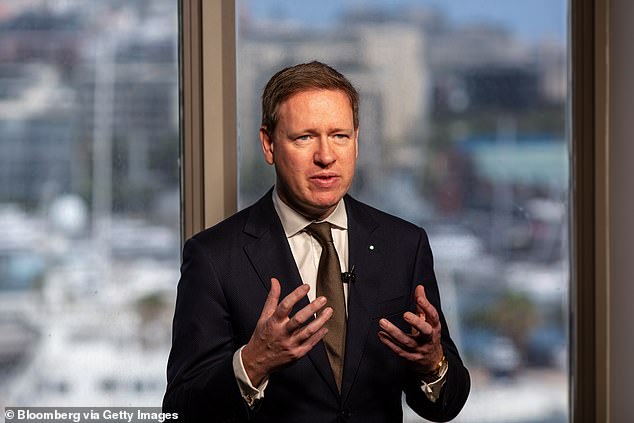The De Beers boss has insisted the company will prosper when it is separated from its current owner, Anglo American, with a listing on the London stock exchange potentially on the line.
Al Cook said the company did “some of our best work” in the 124 years before Anglo took over 12 years ago.
But as Anglo seeks to offload the world’s most prestigious diamond miner, there is speculation it could be listed on the London Stock Exchange with a float of £4bn or sold to a buyer as a sovereign wealth fund.
De Beers is famous for its advertisements that declared “A Diamond is Forever” in 1947 and reshaped the entire engagement ring market.
But it has struggled with a decline in sales and prices, particularly as much cheaper lab-grown stones have risen in popularity.
Plan: De Beers boss Al Cook (pictured) wants to transform the group into a luxury jeweller, more than doubling the number of owned boutiques from 40 to 100 by the end of the decade.
Anglo boss Duncan Wanblad said last month that De Beers was one of four companies he would sell or demerge under a rush strategy that helped fend off a £39bn takeover by rival BHP.
Cook, who has been chief executive of De Beers since February 2023, said he was “consciously disengaging” from Anglo, in a nod to the term used by Gwyneth Paltrow and Coldplay frontman Chris Martin when they divorced on good terms. .
Cook, 49, has unveiled his own roadmap for De Beers.
He wants to transform the 136-year-old group into a leading luxury jeweller, more than doubling the number of its own boutiques from 40 to 100 by the end of the decade.
Although it will continue to mine, the goal is to become a rival to high-end houses such as Cartier and Tiffany.
“Mining will always be necessary and important, and we believe we are very good at it,” Cook told the Mail.
“But it has to be much more than that if we want to be successful in the future.”
The most important thing is that the public falls in love with “natural” diamonds again. He hopes a customer at one of his stores can pick up any piece of jewelry and see which De Beers mine it came from.

Sparks: actress Lily James at a De Beers promotion in London
This is what has driven the name of its strategy ‘Origins’, although it remains to be seen whether it will create a new slogan to rival the blockbuster ‘A Diamond is Forever’.
In this spirit, the group will also stop producing lab-grown diamonds for jewelry after a controversial six-year experiment, although it will continue to make them for industrial purposes, such as the next generation of 6G microchips.
Cook is effectively betting that people are willing to pay large sums of money for luxury brand items, even though there are cheaper alternatives. Cook was an unlikely candidate to lead De Beers, as he spent his career at BP, where he later served as chief of staff to former boss Bob Dudley and Equinor.
He struck up a conversation with Wanblad’s predecessor, Mark Cutifani, almost by chance during a Skype call for a charity board meeting during the pandemic, but there were technical problems.
“The only two people who managed to make the Skype call during this whole charity were Mark and I,” he says. “So we started talking.” After Cutifani surprised him with what De Beers was doing to distribute vaccines in Botswana, Cook suggested a “socially distanced cafe.”
“At the end of the talk I said, ‘You know, if there was ever a vacancy at De Beers, and if you ever considered someone who didn’t know anything about diamonds, I’d be interested.’
De Beers was founded by Cecil Rhodes in 1888 and for 80 years was partly owned by the Oppenheimer family. It has had commercial links with Anglo for most of its history, but it was not until 2012 that Anglo bought its majority 85 per cent stake.
The remaining 15 percent is owned by the government of Botswana, where it mines and regularly sells diamonds.
The benefit of being owned by a conglomerate like Anglo, which has a range of metals businesses, is that there is a built-in safety net.
If the value of one commodity has fallen, it is likely that another has risen, offsetting those swings.
With this in mind, can De Beers really go it alone? “The short answer is, ‘Yes,'” Cook says.
‘For 124 years, we did not have Anglo American as a majority owner. I think possibly some of our best work was done when we were independent.
So I feel confident about that. The Oppenheimers and my predecessors did great things as an independent company and I believe we can do it again.”
Anglo’s greatest legacy, he says, will be the technical mining knowledge it has passed on to De Beers. And he insists the split is amicable, although it will take time.
“Like any couple who consciously decides to separate, we certainly start out with the best of intentions,” Cook says.
‘And we’ve been dating one way for 100 years. I think we’ll do it in a very nice way and at the end of next year we’ll go our separate ways.’
Some links in this article may be affiliate links. If you click on them, we may earn a small commission. That helps us fund This Is Money and keep it free to use. We do not write articles to promote products. We do not allow any commercial relationship to affect our editorial independence.


